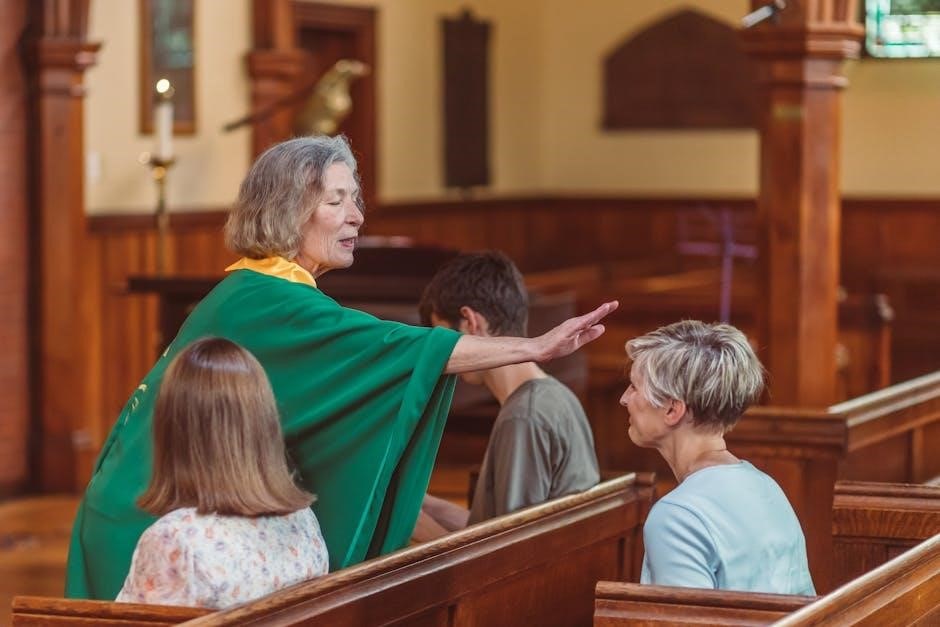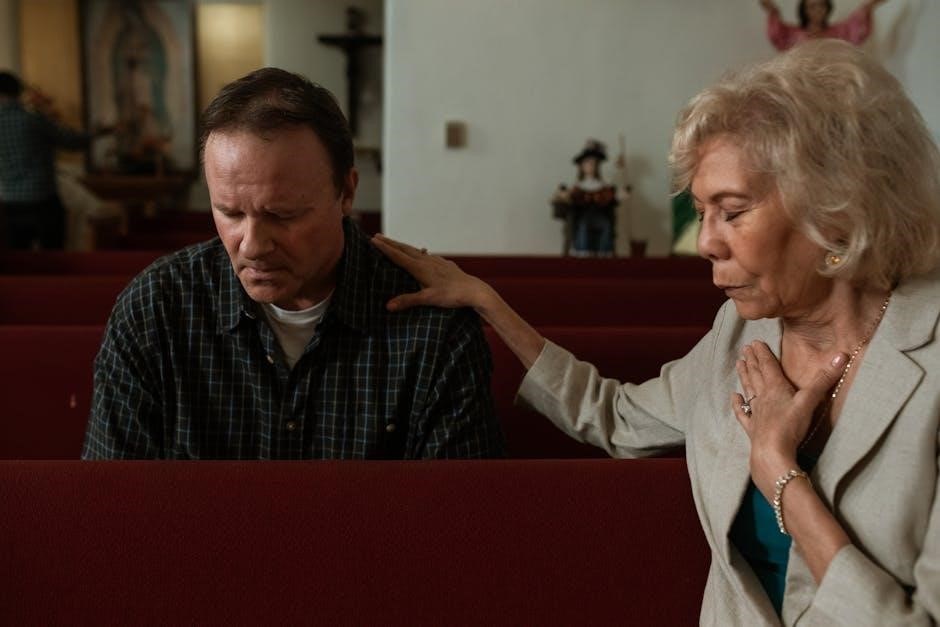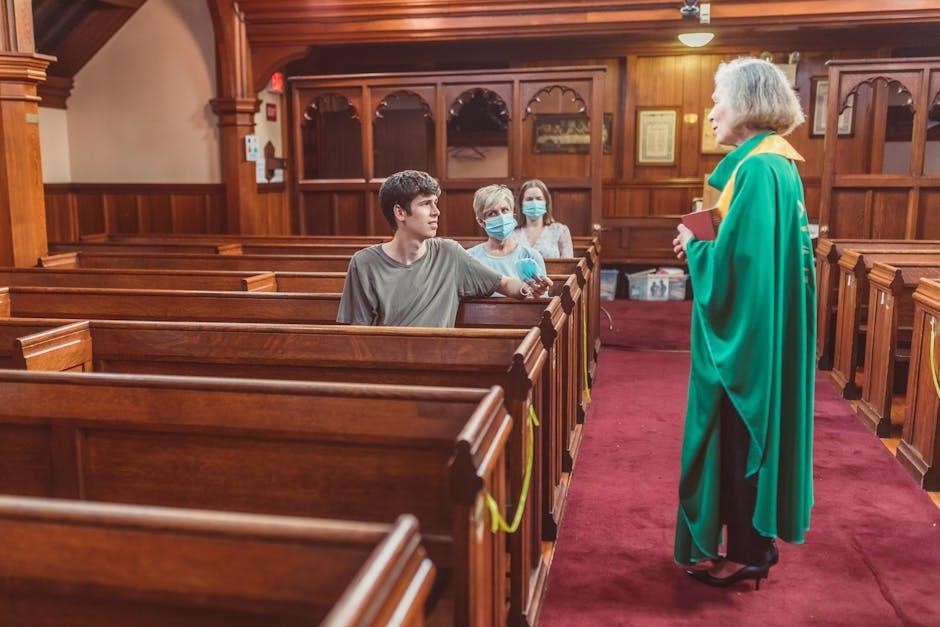Church elders play a vital role in spiritual oversight, shepherding, and doctrinal purity, serving as Christ-like leaders entrusted with nurturing and guiding the congregation according to biblical principles.
The Biblical Basis for the Role of Church Elders
The role of church elders is deeply rooted in Scripture, with clear instructions in Acts 15 and the Epistles of Paul and Peter. Elders are entrusted with spiritual oversight, shepherding, and maintaining doctrinal purity. Acts 20:28 emphasizes their responsibility to care for the flock, while 1 Peter 5:1-4 highlights their role in leading with humility and integrity. The biblical qualifications and duties of elders are outlined in Titus 1:5-9 and 1 Timothy 3:1-7, ensuring they model Christ-like leadership and serve as examples to the congregation.

Qualifications and Characteristics of Church Elders
Elders must be biblically qualified, leading with integrity, wisdom, and faith. They are expected to demonstrate spiritual maturity, diligence in Bible study, and a commitment to Christ-like servanthood.
Biblical Requirements for Elders
The Bible outlines specific qualifications for elders, emphasizing moral integrity, spiritual maturity, and a deep commitment to God’s Word. According to 1 Timothy 3 and Titus 1, elders must be blameless, the husband of one wife, temperate, and hospitable. They should not be lovers of money or given to wine. Elders are also required to be able to teach sound doctrine and refute those who contradict it. Their lives must reflect Christ-like character, serving as examples to the flock and demonstrating a genuine love for God’s people.
The Importance of Spiritual Maturity
Spiritual maturity is crucial for elders as they must model Christ-like behavior and provide godly leadership. Maturity ensures they handle challenges wisely, remain humble, and prioritize God’s will. Their depth in faith equips them to disciple others effectively, fostering a spiritually healthy congregation. Immature leaders risk leading the church astray, emphasizing the need for elders to consistently grow in their walk with God, demonstrating integrity and wisdom in all aspects of their ministry and personal lives.
Spiritual Oversight and Shepherding
Elders must take heed to themselves, shepherd the flock, and be men of God’s Word, ensuring spiritual oversight and nurturing the congregation with integrity and wisdom.
Shepherding the Flock: Nurturing and Protecting the Congregation
Elders are entrusted with shepherding the flock, nurturing believers through teaching, prayer, and guidance, while protecting them from spiritual harm. They must care for the congregation with compassion, visiting the sick, encouraging the discouraged, and addressing spiritual needs. This role reflects Christ-like servanthood, as elders prioritize the well-being of God’s people, ensuring their growth in faith and unity. By fulfilling this duty, elders embody the heart of a shepherd, guarding and nurturing the flock entrusted to their care.
Guarding Doctrinal Purity in the Church
Elders are responsible for safeguarding the church’s doctrinal integrity, ensuring teachings align with Scripture. They must vigilantly prevent false doctrines and promote sound biblical instruction. By upholding the truth, elders protect the congregation from spiritual error, fostering a community rooted in God’s Word. This duty requires discernment, theological depth, and a commitment to preserving the church’s orthodox beliefs, ensuring the flock remains grounded in authentic Christian doctrine and practice.
The Role of Prayer in an Elder’s Ministry
Prayer is central to an elder’s ministry, serving as a vital means of seeking God’s guidance and grace for the church. Elders are called to intercede for the congregation, ensuring spiritual needs are met. Through prayer, they foster a deeper connection with God, leading the church in humble dependence on Him. This ministry of prayer strengthens the elders’ leadership and nurtures a praying community, aligning the church’s efforts with God’s will and purposes.
Leadership and Governance
Elders provide spiritual oversight, guiding the church in unity and purpose, ensuring decisions align with God’s will, and leading as a team to exemplify Christ-like leadership.
Leading the Church as a Team
Elders lead the church collaboratively, combining their unique gifts and wisdom to guide the congregation. They work alongside ministers and other leaders, fostering unity and shared vision. By prioritizing teamwork, elders ensure decisions reflect collective discernment and align with God’s will. This shared leadership approach strengthens the church, promotes accountability, and encourages diverse perspectives, ultimately glorifying God while serving the spiritual needs of the body.
Making Decisions for the Benefit of the Congregation
Elders prioritize decisions that benefit the congregation, seeking God’s will through prayer and collective discernment. They weigh options carefully, ensuring alignment with biblical principles and the church’s mission. By fostering unity and considering diverse perspectives, elders aim to strengthen the church’s spiritual health. Their decisions often involve guiding resources, resolving conflicts, and addressing needs, ensuring the congregation remains focused on Christ and His purposes. This responsibility reflects their commitment to serving as faithful stewards of God’s people.
Teaching and Preaching
Elders are entrusted with preaching and teaching God’s Word, ensuring the congregation is spiritually nourished and guided. This ministry is central to their pastoral responsibility.
Preaching and Teaching the Word of God
Elders are responsible for delivering sermons and instructing the congregation in biblical truths. They ensure the Word is proclaimed accurately, providing spiritual guidance and fostering maturity among believers. Their role involves equipping believers with God’s truth, enabling them to live according to His will. This ministry is vital for the spiritual growth and direction of the church, ensuring that members are rooted in Christ and His teachings.
Equipping Believers for Ministry
Elders are tasked with equipping believers for ministry, helping them discover and utilize their spiritual gifts. They provide teaching, encouragement, and resources to empower members for service. This involves fostering a culture of discipleship and enabling believers to fulfill their roles in the church and community. By equipping the saints, elders ensure the church grows in maturity and effectiveness, fulfilling its mission to glorify God and serve others.
Administering the Sacraments
Elders are responsible for administering sacraments such as communion and baptism, which are central to the life of the church. They ensure these ordinances are conducted with reverence and in accordance with biblical teachings. By overseeing these sacred acts, elders help the congregation connect with Christ and deepen their spiritual life. This duty reflects their role as stewards of God’s grace and guardians of the church’s spiritual practices.

Caring for the Congregation
Elders are entrusted with nurturing and caring for the spiritual and emotional well-being of the congregation, providing guidance and support to strengthen their faith and community bonds.
Pastoral Care and Counseling
Elders provide compassionate pastoral care and counseling to congregation members, offering spiritual guidance, emotional support, and prayer. They visit the sick, comfort the grieving, and address personal struggles. By modeling Christ-like empathy, elders foster a culture of care and unity within the church. Their role involves mediating conflicts and encouraging believers to walk faithfully in their relationship with God. Through their ministry, elders ensure the flock feels loved, supported, and equipped to face life’s challenges with hope and resilience.
Visiting and Encouraging Church Members
Elders are responsible for visiting and encouraging church members to foster spiritual growth and unity. Through personal interactions, they offer support, prayer, and guidance, helping believers stay connected to God and the church. These visits strengthen relationships and provide comfort, ensuring no one feels isolated. By actively engaging with the congregation, elders promote a sense of belonging and encourage members to live out their faith faithfully. This ministry is crucial for building a compassionate and supportive church community.
Serving the Community
Elders are called to serve the community by demonstrating Christ’s love through practical acts of kindness and compassion. They lead the church in meeting physical and spiritual needs, fostering relationships, and addressing social issues. By organizing outreach initiatives and encouraging member involvement, elders model servanthood and promote unity. Their role extends beyond the church walls, reflecting Christ’s heart for the world and advancing His kingdom through tangible expressions of love and care.

Church Discipline and Accountability
Elders ensure accountability among members, addressing sin with compassion and correction, while restoring those who fall, maintaining doctrinal purity and promoting holiness within the congregation.
Ensuring Accountability Among Church Members
Elders are responsible for maintaining spiritual accountability within the church, ensuring members adhere to biblical standards, and addressing sin with love and correction. They guide the congregation in living according to God’s Word, fostering a culture of integrity and holiness. Through teaching and example, elders encourage believers to walk in obedience, providing guidance and support for those struggling. This role is essential for preserving unity and doctrinal purity, ensuring the church remains a beacon of Christ’s truth. Elders lead by example, demonstrating accountability in their own lives first.
Restoring Those Who Have Fallen into Sin
Elders are called to compassionately restore believers who have fallen into sin, guiding them back to spiritual health through biblical guidance and prayer. This process, done with sensitivity and love, aims to renew their faith and reconciliation with God and the church. Elders address sin with grace and truth, ensuring the individual understands their error and seeks repentance. Restoration strengthens both the individual and the church, fostering a culture of accountability and spiritual growth. Elders act as instruments of healing, reflecting Christ’s redemptive love.

Servant Leadership
Elders exemplify servant leadership by leading with humility, compassion, and integrity, modeling Christ-like behavior for the congregation, reflecting Christ’s love in their actions.
Modeling Christ-like Servanthood
Modeling Christ-like servanthood is central to an elder’s role, as they lead with humility, compassion, and integrity. Elders reflect Christ’s love by prioritizing others’ needs, demonstrating selflessness, and serving the church. Their actions embody Christ’s teachings, fostering a culture of humility and service within the congregation. By living out their faith authentically, elders inspire believers to follow Christ’s example, creating a community rooted in love, sacrifice, and devotion to God’s will. This servanthood mindset is foundational to their leadership and spiritual influence.
Leading with Humility and Compassion
Elders must lead with humility, recognizing their role as servants of God and His church. Compassion guides their interactions, ensuring they address the spiritual and emotional needs of the congregation. By modeling humility, they foster unity and trust, while their compassion creates an environment of care and support. Elders are called to guide gently, resolve conflicts peacefully, and comfort those in distress. Their leadership, rooted in humility and compassion, reflects Christ’s heart for His people, inspiring others to follow His example of selfless love and service.
The role of church elders is profoundly significant, rooted in biblical principles and centered on shepherding, teaching, and leading with humility. Elders are entrusted with guiding the congregation spiritually, ensuring doctrinal purity, and fostering a culture of care and compassion. Their ministry exemplifies Christ-like servanthood, equipping believers for ministry and nurturing the flock. By fulfilling their duties with integrity and love, elders play a vital role in advancing God’s mission through the church, ultimately glorifying Him in all they do.
